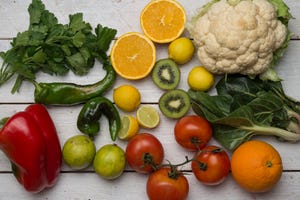
Strengthen Your Immune System This Winter With These Foods - CNET
The weather has turned colder and flu and cold viruses are thriving. Stay healthy this winter and year-round by ensuring your immune system is ready for a fight — unless you want to be stuck in bed with the sniffles all winter long.
The good news is that there’s a lot you can do to boost your immunity, including tweaking your diet. Let’s take a look at how your diet can affect your ability to stay healthy and explore some of the best foods for immune health.
Can food boost your immune system?
Your immune system is an intricate network of cells, chemical compounds and pathways, all of which work together to defend your body from infection. The human body is built with powerful defense mechanisms that not only innately fend off foreign invaders, such as viruses and bacteria, but also learn to recognize new ones so they can better do their job, according to Cleveland Clinic.
To function effectively, however, your immune system needs your help. This involves a range of different supporting behaviors, from getting enough rest and managing stress levels to exercising regularly and, yes, getting adequate nutrition. Each of these factors is important, but we’ll focus especially on diet here.

Malnutrition has been associated with poor immune health in many studies. Low levels of vitamins C and D or zinc, for instance, have been shown to increase inflammation and boost susceptibility to infections. These aren’t the only nutrients your immune system requires, though. It needs a wide array of nutrients to perform at its best.
If you’re unable to get enough of certain nutrients through your diet, multivitamins can be a helpful supplement. The best way to determine if you’re deficient in any nutrients and would benefit from a multivitamin is asking a doctor.
However, you don’t have to take supplements or eat specific “immune-boosting foods” like garlic or ginger to strengthen your immune health, per Harvard Health. Rather, you can focus on eating a well-rounded diet that includes all of the necessary nutrients. These include:
- Vitamin A
- Vitamins B6 and B12
- Vitamin C
- Vitamin D
- Vitamin E
- Zinc
- Selenium
- Iron
- Copper
- Folic acid (folate)
- Fiber
- Protein (including the amino acid glutamine)
It’s also important to understand the role your gut plays in regulating your immune health. In fact, 70% of your immune system is located in your gut, and the bacteria that live there have a significant impact on your immune health, according to UCLA Health. That means not only do you need a diet rich in the above nutrients but one that supports gut health. A gut-healthy diet includes plenty of fruits, vegetables and whole grains and limits highly processed foods, refined sugars and red meat. You can also support your gut with prebiotic and probiotic foods, which we’ll discuss in more detail below.
Which foods should you shop for?

A nutrient-rich, immune-healthy diet can take various shapes, according to the Mayo Clinic. You don’t have to eat a specific set of foods to get everything you need, so you can plan your diet in a way that fits your preferences and budget.
Here are some examples of nutrient-dense foods for immune health that you can include in your diet, courtesy of Harvard Health and the British Nutrition Foundation:
- Orange and red fruits and vegetables such as carrots, bell peppers and apricots are rich in vitamin A, which supports healthy skin. Your skin is a critical first line of defense against infection.
- Citrus fruits such as oranges, grapefruit, strawberries, and tomatoes are packed with vitamin C, one of the most important vitamins for supporting immune health.
- Iron- and protein-rich foods such as meat, fish, beans, nuts and fortified cereals support healthy immune cell growth and functioning.
- Many seeds, nuts, peanut butter and vegetable oils contain vitamin E, an antioxidant that helps to fight off free radicals and bolster your immune health.
- Whole grains, along with many types of meat, seeds and nuts, provide zinc, which supports wound healing and strengthens immune response.
- Poultry, fish, some other meats, eggs, bananas and avocados contain vitamins B6 or B12 (and some contain both), which are important for new immune cell growth and communication.
- Oily fish, eggs and some fortified cereal and dairy products include vitamin D, which seems to support better immune response.
- Bread, rice, quinoa, shellfish and dried fruit are rich in copper, an important booster for immune cells.
- Green vegetables, berries, oranges, nuts and seeds contain folate, which assists in new cell production.
- Foods with active cultures such as kefir, kombucha, kimchi, fermented vegetables and some yogurts are known as probiotics because they add to the good bacteria in your gut.
- Garlic, onions, leeks, asparagus and seaweed, along with many fruits, vegetables and whole grains, are considered prebiotic foods because they contain fiber and oligosaccharides to feed and support the bacteria in your gut.
As you can see, there is overlap on this list, and many foods offer multiple nutrients that support immune health. A balanced diet, good rest, plenty of exercise and habits that reduce stress, are all key ingredients for building a strong immune system.
The information contained in this article is for educational and informational purposes only and is not intended as health or medical advice. Always consult a physician or other qualified health provider regarding any questions you may have about a medical condition or health objectives.

